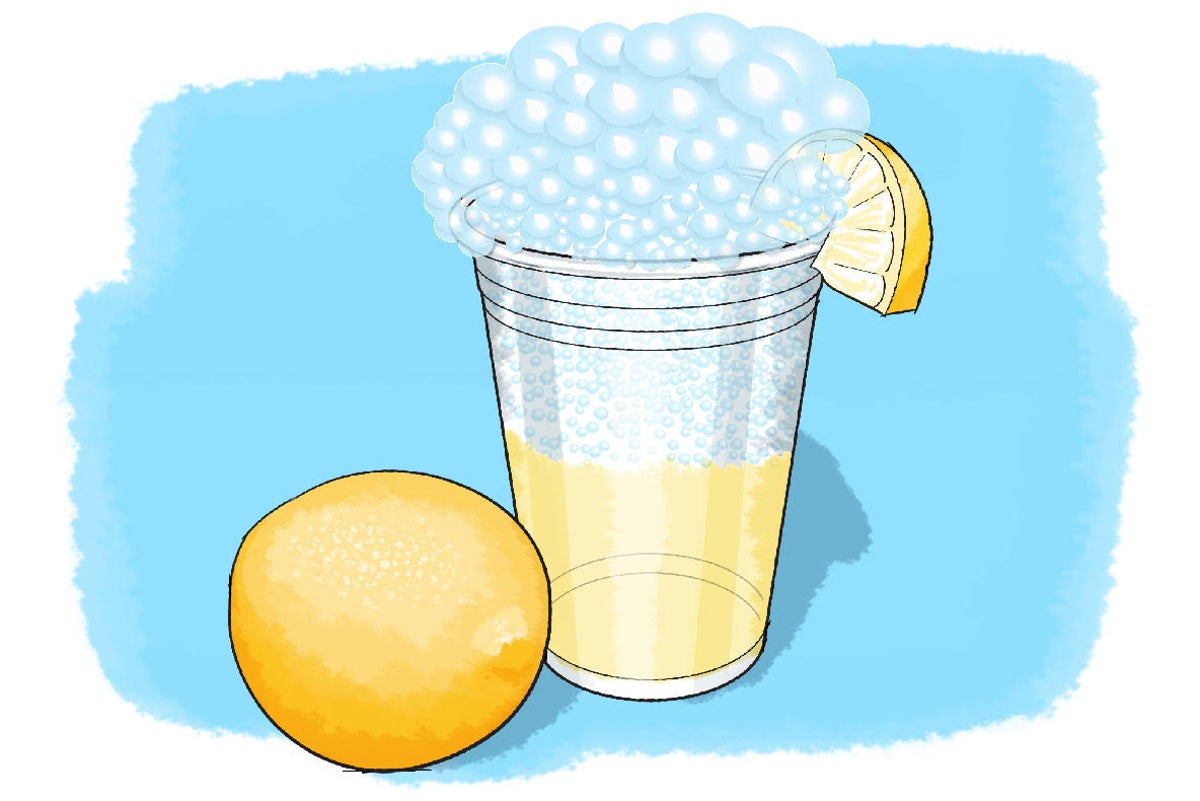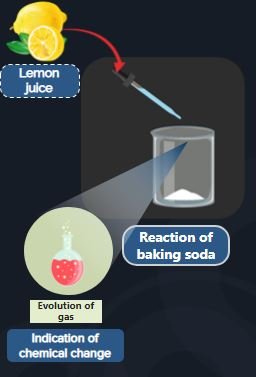Baking soda mixed with lemon juice creates a chemical reaction that produces carbon dioxide gas. This reaction causes fizzing and bubbling.
Baking soda, a base, reacts with the acidic lemon juice to form carbon dioxide, water, and sodium citrate. This reaction is often used in baking to help dough rise, as the carbon dioxide bubbles expand. It also serves various household purposes, such as cleaning and deodorizing.
The effervescence created by mixing these two ingredients can be visually appealing and useful in demonstrations. The combination of baking soda and lemon juice can also be used in DIY beauty treatments, like facial scrubs, due to their exfoliating and brightening properties. This simple yet effective chemical reaction showcases basic principles of chemistry in everyday life.
:max_bytes(150000):strip_icc()/homemade-and-natural-cleaning-products-1900456_final_3-cd0d455d6bee4370ae9aaefd902493ca.png)
Chemical Reaction Basics
Baking soda is a white powder. It is also called sodium bicarbonate. It is a base. Bases can neutralize acids. Baking soda reacts with acids to form bubbles. These bubbles are made of carbon dioxide gas.
Lemon juice is a liquid from lemons. It is acidic. The main acid in lemon juice is citric acid. Lemon juice also has vitamin C. The acid in lemon juice makes it sour. When mixed with baking soda, it causes a reaction. This reaction produces bubbles. These bubbles are carbon dioxide gas.

Mixing Process
First, gather baking soda and lemon juice. Measure one teaspoon of baking soda. Pour it into a clean bowl. Now, squeeze half a lemon. Collect the juice in a small cup. Slowly pour the lemon juice over the baking soda. Watch the mixture bubble and fizz. Stir gently with a spoon. The reaction will produce a fizzing sound. It will settle down after a few seconds.
Always work in a well-ventilated area. Wear gloves to protect your hands. Avoid touching your face. Keep the mixture away from your eyes. Wash your hands after mixing. If the mixture spills, clean it right away. Store ingredients in a cool, dry place. Never ingest the mixture. Keep it out of reach of children. Always follow these safety tips.
Visible Changes
Mixing baking soda with lemon juice creates a fizzy reaction. This mixture releases carbon dioxide, forming bubbles. The solution becomes a natural cleaner and deodorizer.
Fizzing And Bubbling
Mix baking soda with lemon juice. You will see fizzing and bubbling. This reaction happens quickly. The bubbles are carbon dioxide gas. Kids love to watch this fun experiment.
Color Changes
The mixture may change color. Lemon juice is yellow. Baking soda is white. When mixed, the color can look cloudy. Sometimes, it might even look a bit foamy. This change is part of the reaction.
Chemical Equations
Baking soda and lemon juice are the reactants. The products are carbon dioxide gas, water, and sodium citrate. The reaction is a type of acid-base reaction.
The equation is:
| Reactants | Products |
|---|---|
| NaHCO3 (baking soda) + C6H8O7 (citric acid) | CO2 + H2O + Na3C6H5O7 (sodium citrate) |
Each side of the equation must have the same number of atoms. This keeps the equation balanced.
Practical Applications
Mixing baking soda with lemon juice creates a powerful cleaning solution. This mix can clean many surfaces. It works well on kitchen counters and bathroom tiles. The fizzing action helps remove tough stains. It also gets rid of bad smells. People use it to clean microwaves and ovens. It is safe for most surfaces. Always test a small area first.
Combining baking soda with lemon juice has many cooking uses. This mix helps dough rise. It makes baked goods fluffy and light. Use it in cakes and pancakes for a better texture. The acid from lemon juice reacts with baking soda. This reaction creates carbon dioxide bubbles. These bubbles help your food rise. It also adds a zesty flavor to recipes.

Scientific Explanation
Baking soda is a base. Lemon juice is an acid. When mixed, they react. This reaction is called an acid-base reaction. The result is the formation of new substances. These include water, salt, and gas.
The gas produced is carbon dioxide. You can see it as bubbles. This gas makes the mixture fizz. The fizzing is a sign of the reaction. The reaction stops when all baking soda or lemon juice is used up.
Environmental Impact
Baking soda and lemon juice can clean your home. This mixture is very safe. It does not harm the environment. Many cleaning products have harmful chemicals. These chemicals can pollute water and soil. Baking soda and lemon juice are natural. They are safe for plants and animals.
Baking soda and lemon juice break down easily. They do not stay in the environment for long. This makes them biodegradable. Biodegradable items are better for the Earth. They help keep our planet clean. Using these natural cleaners is a smart choice.
Fun Experiments
Mixing baking soda with lemon juice creates a fizzy reaction, producing carbon dioxide gas and forming bubbles. This simple experiment demonstrates basic principles of chemistry and is fun for kids and adults alike.
Volcano Project
Mixing baking soda and lemon juice creates a fizzy reaction. This reaction looks like an erupting volcano. First, make a volcano shape using clay or playdough. Next, place a small container inside the volcano. Pour baking soda into the container. Finally, add lemon juice. Watch the bubbles and foam rise like lava. This is a fun and educational experiment.
Homemade Rocket
Creating a homemade rocket is easy with baking soda and lemon juice. Use a small container, like a film canister. Fill it halfway with lemon juice. Quickly add a teaspoon of baking soda. Close the lid and step back. The reaction builds pressure, launching the lid into the air. This demonstrates the power of chemical reactions. Always do this outside and with adult supervision.
Frequently Asked Questions
What Happens When You Mix Baking Soda And Lemon Juice?
When baking soda and lemon juice mix, they create a chemical reaction. This reaction produces carbon dioxide gas, causing fizzing and bubbling.
Is Baking Soda And Lemon Juice Safe For Cleaning?
Yes, baking soda and lemon juice are safe for cleaning. This mixture is natural, non-toxic, and effective for removing stains and odors.
Can Baking Soda And Lemon Juice Whiten Teeth?
Baking soda and lemon juice can help whiten teeth. However, use sparingly to avoid enamel damage due to acidity.
Does Lemon Juice Deactivate Baking Soda?
No, lemon juice does not deactivate baking soda. Instead, it activates baking soda, producing a fizzing reaction and releasing carbon dioxide.
Conclusion
Mixing baking soda with lemon juice creates a powerful chemical reaction. This combination offers various benefits, from cleaning to health remedies. Always use it carefully and in the right proportions. Discover the potential of these common household items and enhance your daily routines effortlessly.
Try it and see the amazing results!
